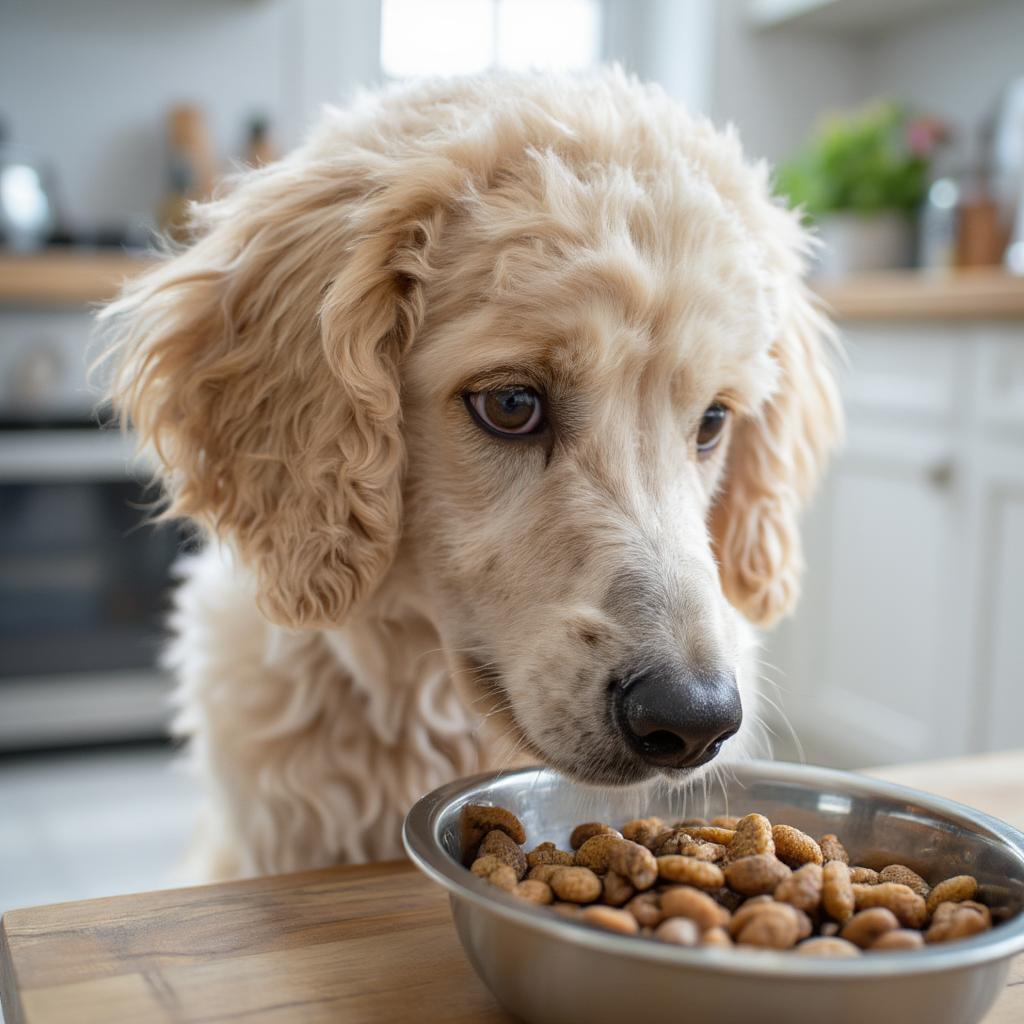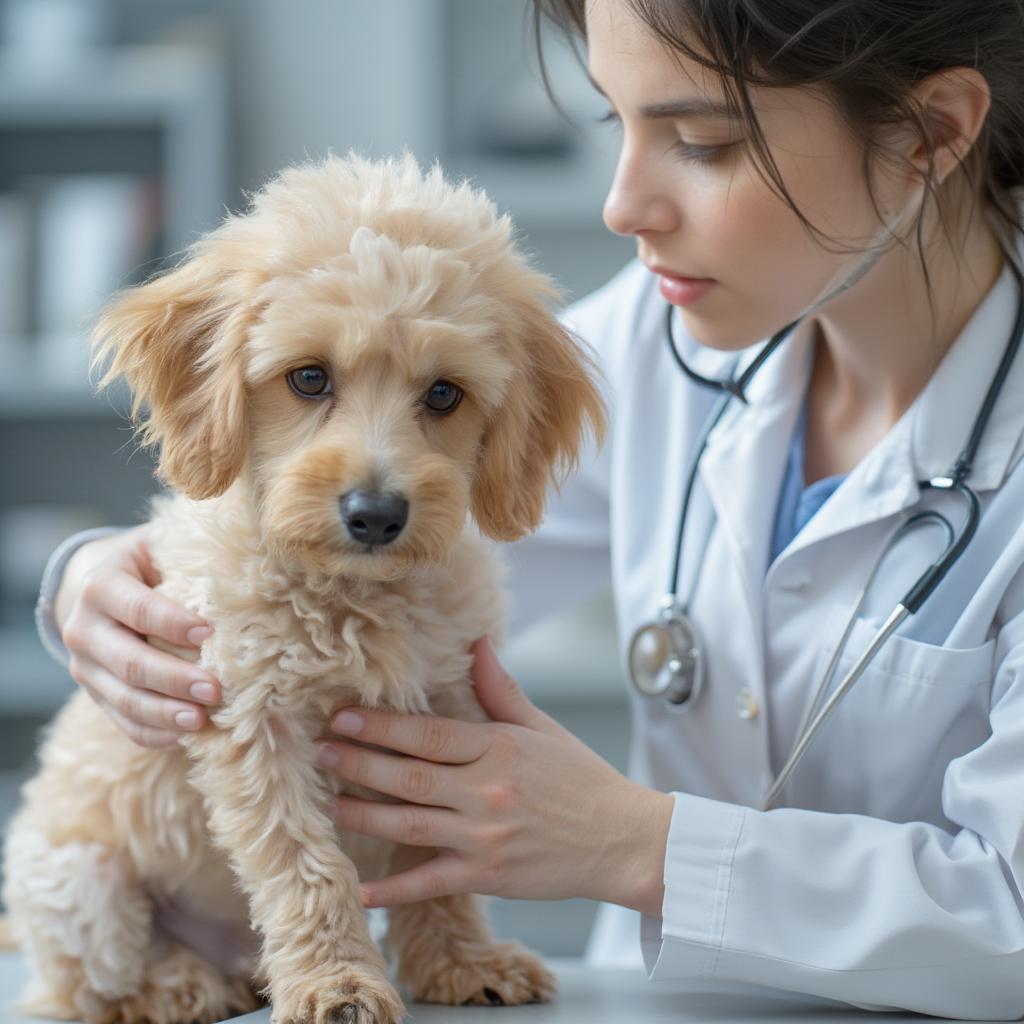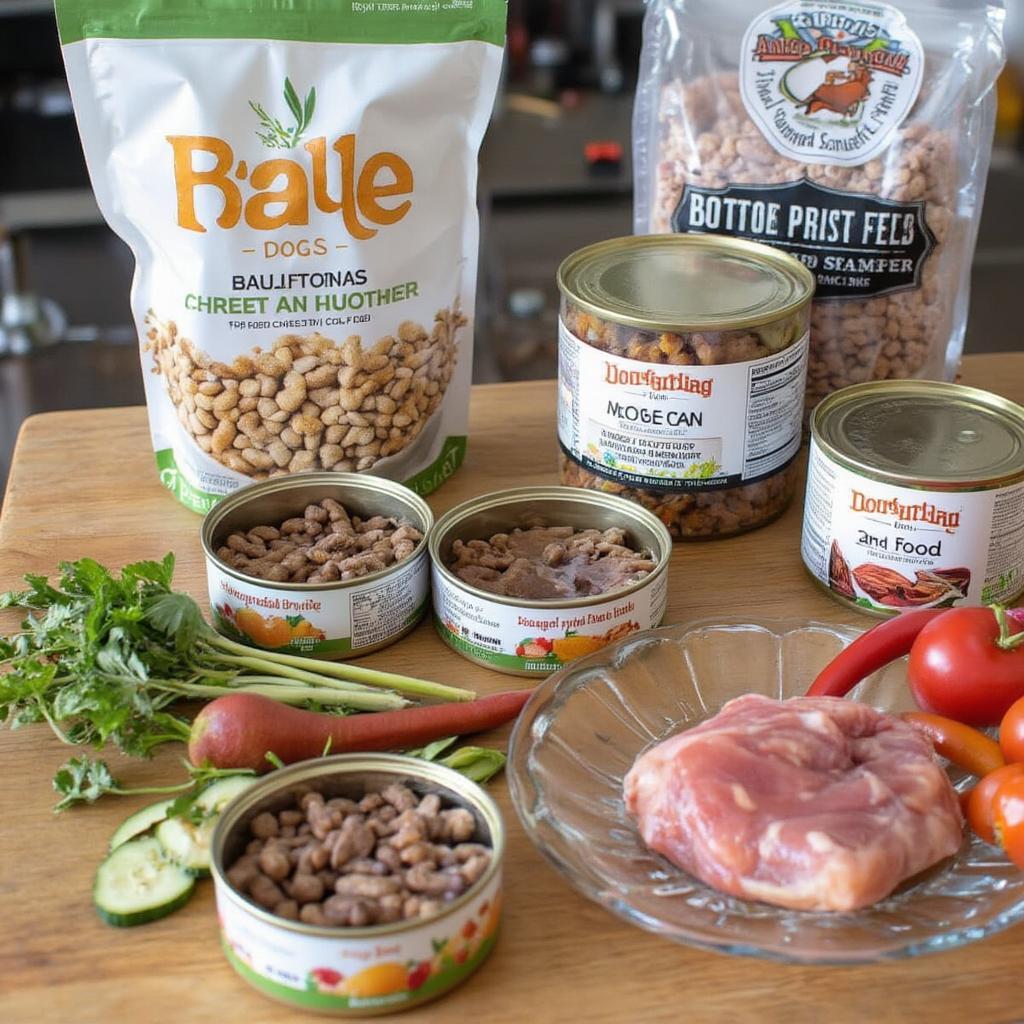Poodles, known for their intelligence and elegance, are beloved companions worldwide. But What Do Poodles Like To Eat? Understanding their nutritional needs is crucial for ensuring a long, healthy, and happy life for your furry friend. This comprehensive guide will delve into the specifics of poodle nutrition, covering everything from essential nutrients to feeding schedules and common dietary concerns.
Decoding the Poodle Diet: Essential Nutrients for Optimal Health
Just like humans, poodles require a balanced diet packed with essential nutrients to thrive. These include proteins, fats, carbohydrates, vitamins, and minerals. High-quality protein sources, such as meat and fish, provide the building blocks for strong muscles, healthy skin, and a shiny coat.
The Role of Protein in a Poodle’s Diet
Protein is crucial for poodle growth and development, particularly during puppyhood. Look for dog foods with meat or fish listed as the primary ingredient. Chicken, lamb, beef, salmon, and turkey are all excellent options.
Fats: Fueling Energy and Supporting Brain Function
Healthy fats are essential for providing energy, supporting brain function, and promoting healthy skin and coat. Sources of healthy fats include fish oil, chicken fat, and flaxseed oil. Avoid foods high in saturated and trans fats.
Carbohydrates: Providing Energy for Daily Activities
Carbohydrates provide poodles with the energy they need for daily activities. Choose complex carbohydrates like brown rice, sweet potatoes, and oats over simple carbohydrates like white rice and corn.
Feeding Your Poodle: A Guide to Portion Sizes and Feeding Frequency
How much and how often you feed your poodle depends on several factors, including age, activity level, and overall health. Puppies require more frequent meals than adult dogs. Consult with your veterinarian to determine the appropriate portion size and feeding schedule for your individual poodle.
Puppy Feeding Guidelines: Nurturing Growth and Development
Poodles puppies have specific nutritional needs to support their rapid growth. They require higher calorie and protein intake than adult dogs. Feeding them small, frequent meals throughout the day is essential.
Adult Poodle Feeding: Maintaining a Healthy Weight and Lifestyle
Adult poodles typically need two meals per day. Monitor their weight and adjust portion sizes as needed to prevent obesity. Always provide fresh, clean water.
 Adult Poodle Enjoying a Healthy Meal
Adult Poodle Enjoying a Healthy Meal
Common Dietary Concerns for Poodles
Poodles are prone to certain health issues, including food allergies, bloat, and pancreatitis. Being aware of these potential problems can help you make informed dietary choices for your poodle.
Food Allergies in Poodles: Identifying and Managing Sensitivities
Food allergies can manifest as skin irritation, digestive problems, and ear infections. Common allergens include beef, chicken, dairy, and wheat. If you suspect your poodle has a food allergy, consult your veterinarian.
Bloat: A Serious and Potentially Life-Threatening Condition
Bloat, also known as gastric dilatation-volvulus (GDV), is a life-threatening condition that can affect deep-chested breeds like standard poodles. Feeding smaller, more frequent meals and avoiding strenuous exercise after eating can help reduce the risk.
 Veterinarian Checking a Poodle for Allergies
Veterinarian Checking a Poodle for Allergies
Choosing the Right Food for Your Poodle: Dry Kibble, Wet Food, or Raw Diet?
With so many dog food options available, choosing the right one for your poodle can be overwhelming. Consider factors such as your poodle’s age, activity level, health conditions, and personal preferences.
Dry Kibble: A Convenient and Cost-Effective Option
Dry kibble is a popular choice due to its convenience and affordability. Look for high-quality kibble with meat or fish as the first ingredient and avoid products with fillers and artificial additives.
Wet Food: A Palatable and Hydrating Choice
Wet food is often more palatable than dry kibble and can be a good option for picky eaters or poodles who need extra hydration.
Raw Food Diets: A Controversial but Increasingly Popular Option
Raw food diets consist of uncooked meat, bones, vegetables, and fruits. While proponents claim numerous benefits, raw diets also carry potential risks, including bacterial contamination and nutritional imbalances. Consult with your veterinarian before switching your poodle to a raw food diet.
 Variety of Dog Food Options for Poodles
Variety of Dog Food Options for Poodles
What Foods Are Toxic to Poodles?
Certain foods that are safe for humans can be toxic to dogs, including poodles. Avoid feeding your poodle the following:
- Chocolate
- Grapes and raisins
- Onions and garlic
- Macadamia nuts
- Xylitol (artificial sweetener)
- Avocado
Conclusion: Providing Your Poodle with a Nutritious and Delicious Diet
Feeding your poodle a balanced and nutritious diet is essential for their overall health and well-being. By understanding their specific dietary needs and avoiding potentially harmful foods, you can help your poodle live a long, happy, and healthy life. Remember to consult with your veterinarian for personalized dietary recommendations tailored to your poodle’s individual needs. What do poodles like to eat ultimately depends on individual preferences, but with careful consideration and guidance, you can ensure your poodle thrives on a delicious and nutritious diet.
Frequently Asked Questions about Poodle Nutrition
-
What is the best dog food for a standard poodle? The best dog food depends on individual needs. Consult your vet for recommendations.
-
Can poodles eat human food? Some human foods are safe for poodles in moderation, but many are toxic.
-
How much should I feed my toy poodle puppy? Follow your veterinarian’s recommendations for puppy feeding guidelines.
-
Are grain-free diets good for poodles? Consult with your vet to determine if a grain-free diet is appropriate for your poodle.
-
What are the signs of a food allergy in a poodle? Common signs include itching, skin irritation, digestive problems, and ear infections.
-
How can I prevent bloat in my standard poodle? Feed smaller, more frequent meals and avoid strenuous exercise after eating.
-
Can I feed my poodle a raw diet? Discuss the risks and benefits of raw diets with your veterinarian before making a decision.
